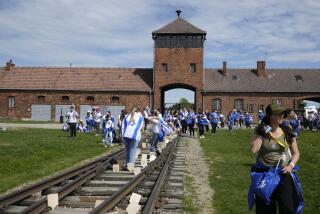Thousands March to Preserve Chernobyl Aid
- Share via
KIEV, Ukraine — Thousands of people, including children in wheelchairs and widows holding black-banded portraits of their husbands, paraded down this city’s central boulevard Sunday demanding that the government maintain pensions and subsidies for victims of the world’s worst nuclear accident, at Chernobyl.
Among those protesting were workers who took part in the cleanup after the disaster and children whose birth defects have been ascribed to the radioactive smoke that spewed out of the plant, about 80 miles north of here, when its No. 4 reactor exploded and caught fire early on April 26, 1986.
Organizers of the march put the number of protesters at 10,000, but journalists estimated it was only about half that. Nevertheless, the column stretched for several city blocks as it proceeded first through a median-strip park and then down Kreshchatik Street, Kiev’s main boulevard, which was closed to traffic.
The Chernobyl Union, which lobbies for the victims of the accident, organized the demonstration in an effort to halt plans by Ukraine’s cash-strapped government to reduce aid in next year’s budget.
Among the privileges at risk in the government’s cost-cutting plans are an end to free public transportation and the abolition of a 50% rent subsidy given to the Chernobyl families.
More than 2.2 million of Ukraine’s 50 million residents are eligible for benefits stemming from the accident, either as victims or as family members of victims.
“We try not to use the word ‘privilege,’ ” said Georgy Khilya, 42, one of the marchers. “These are certain guarantees the government has given to the people who either volunteered or were sent to Chernobyl to save the country from a nuclear catastrophe.”
Khilya said he was sent to the area as a soldier and has been hospitalized repeatedly during the years since with lung and cardiovascular problems.
Another marcher was Nina Ryzhuk, carrying a hand-colored photograph of her husband, Vasily. According to her, he volunteered to help in the cleanup immediately after the accident and suffered health problems from various ailments for the rest of his life until he died last year at 67.
“No one can give me back my husband, but at least leave us the benefits. . . . Without them, it will be impossible to live,” she said.
The Chernobyl Union leader, Yuri Andreyev, said it was a coincidence that the march was held just as Ukraine is getting ready--after years of pressure from the European Union and the United States--to shut down the last functioning reactor at the Chernobyl nuclear power station.
Still, many of the march participants said they see the impending shutdown, scheduled for Dec. 15, as an omen that they will be forgotten.
The number of people killed by the Chernobyl disaster remains a matter of some dispute. It is known that about 30 plant workers and firefighters died soon after the accident from radiation exposure.
Statisticians believe that thousands more people have since died prematurely as a result of cancers or other accident-related illnesses.
More to Read
Sign up for Essential California
The most important California stories and recommendations in your inbox every morning.
You may occasionally receive promotional content from the Los Angeles Times.













